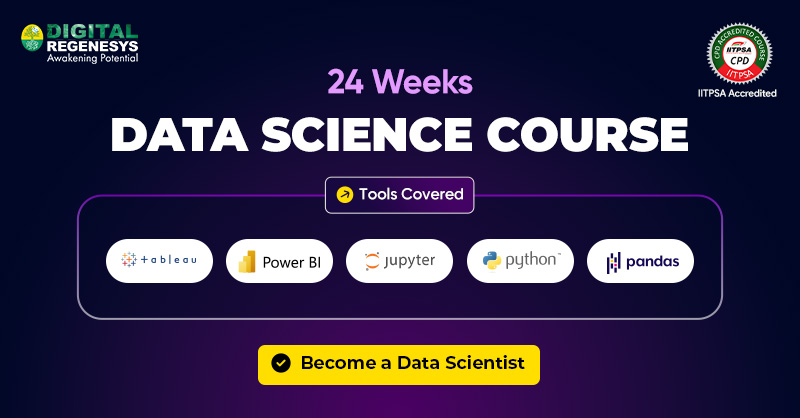Understand the Data Science Syllabus: Your Path to Tech Careers

Choosing to study data science is more than simply learning new technologies. It is about following a structured path that equips you with both technical knowledge and practical skills. The foundation of this journey lies in the course design, and a well-planned syllabus plays a decisive role in shaping future opportunities. A well-structured syllabus helps learners understand what to expect, the skills they will acquire, and how these skills will translate into the workplace.
In this article, we will examine what a data science syllabus typically encompasses, its significance, and how it aligns with industry demands in South Africa. We will also examine the differences between online and campus study, its global relevance, and how it prepares learners for long-term career growth. For those considering a career in data science, understanding the syllabus is a crucial first step.
Why the Data Science Syllabus Matters?
Every course you choose is built around a central plan that guides learning from the first lesson to the last assessment. A strong data science syllabus ensures that you do not miss any essential skills and helps you gain confidence in your progress. This matters because data science is a broad field that combines mathematics, programming, business insights, and problem-solving. Without a structured approach, learners may struggle to connect the pieces.
Here are the reasons why the syllabus plays such a vital role:
- It gives clarity on what you will study, when you will study it, and how each module fits into the bigger picture.
- Areas such as Python, SQL, statistics, and machine learning are core parts of the syllabus for the data science course in SA, ensuring no critical subjects are left out.
- Employers seek graduates with practical skills. A syllabus that covers employer-demanded skills in SA increases the chances of job readiness.
- The inclusion of projects, case studies, and real-world examples ensures the knowledge gained is not limited to textbooks.
Check out “Why It Is Important to Understand the Syllabus of a Data Science Course” on our blog for more insights.

What Learners Should Look for in a Data Science Syllabus?
choosing a course is not only about joining a class but about ensuring the syllabus matches personal and career goals. A well-structured syllabus gives clarity on what you will learn at each stage and how the knowledge builds up over time. When reviewing a data science course syllabus, it helps to see whether it moves gradually from introductory concepts to advanced applications, while also offering space for independent learning. Below is how the syllabus is organised at different levels.
1. Introductory Data Science Modules
These modules build the foundation by introducing essential tools and skills. They are ideal for beginners who want to gain confidence in programming and understand how data can be applied in simple ways.
- Python Programming Foundations
This module covers the basics of Python coding, including syntax, loops, and functions. It is designed to help learners write clean code and solve problems using structured programming methods.
- Applied Python for Data Applications
Learners move beyond theory and apply Python in real data-related tasks. This includes working with libraries, datasets, and scripts to handle common data manipulation challenges.
2. Intermediate Data Science Modules
At this stage, learners begin exploring data more deeply while gaining skills in visualisation and business intelligence. These modules connect theory with meaningful insights.
- Data Exploration & Insight
This module focuses on techniques to clean, process, and interpret data. Learners practise identifying patterns, trends, and insights that guide better decisions.
- Business Intelligence & Data Visualisation with Power BI
The emphasis is on presenting data clearly using Power BI. Learners build dashboards and reports that communicate results in a way business teams can understand.
3. Advanced Data Science Modules
These modules are focused on preparing learners for professional roles by building strong machine learning skills and experience in project deployment.
- Machine Learning for Predictive Analytics
This module introduces supervised and unsupervised machine learning methods. Learners build models to predict outcomes, classify data, and work with algorithms applied in real businesses.
- Data Science Project Deployment
Here, learners gain practical experience in deploying machine learning models. This covers steps such as preparing models for production, testing them in real environments, and ensuring reliability.
4. Self-Paced Modules
The self-paced modules give learners flexibility to strengthen specific skills. These modules can be studied independently alongside the main syllabus, helping to fill any knowledge gaps.
- Spreadsheet Essentials with Excel
Learners improve data handling with Excel, including formulas, pivot tables, and charts for effective analysis.
- Data Management Using MySQL
This module teaches database creation and queries using SQL. Learners practise retrieving, updating, and managing structured data effectively.
- Tableau
Learners gain skills in building interactive dashboards and visualisations with Tableau, one of the most widely used analytics tools syllabus in SA.
- MongoDB
This module introduces working with unstructured data using MongoDB, enabling learners to manage NoSQL databases and understand real-time data processing.
Industry Relevance of the Data Science Syllabus
The true strength of a data science syllabus lies in how closely it matches what employers are looking for. In South Africa, industries such as banking, retail, healthcare, and telecommunications are all looking for professionals who can make sense of data and apply it to real problems. An industry-relevant syllabus in SA bridges the gap between academic learning and workplace expectations. This ensures that learners are not only knowledgeable but also capable of applying skills in professional environments.
Here is how the data science syllabus connects to industry needs.
Statistical modelling and analytics practice
Many organisations rely on accurate data analysis for decision-making. By learning statistical modelling, learners develop the ability to forecast trends, measure risks, and make sense of business data, which is essential in finance and marketing.
Machine learning and AI projects
The inclusion of modules from the AI & deep learning syllabus in SA allows learners to work on predictive systems. These projects mirror tasks in real companies, such as fraud detection in banks, customer targeting in retail, and patient diagnosis support in healthcare.
Database and big data modules
Employers demand strong database management skills. A well-designed SQL syllabus in SA teaches how to query structured datasets, while exposure to tools like PySpark ensures learners can handle massive datasets common in sectors like telecommunications and e-commerce.
Soft skills and teamwork
The soft skills syllabus in SA is vital because employers do not only want technical experts but also professionals who can explain insights clearly. Skills like presenting findings, writing reports, and working in teams are part of daily business operations.
Job readiness focus
Courses that include industry-aligned projects ensure learners graduate with confidence. These elements mirror workplace demands, helping students transition smoothly into employment with relevant and up-to-date competencies.
For additional guidance, you can read“How Does the Syllabus of a Data Science Course Align with Industry Needs?”
Online and Campus Study Options for Data Science Syllabus
When choosing a data science course, learners often ask whether online or campus study is more effective. The truth is, both have unique strengths. An online data science syllabus in SA offers flexibility and convenience for working professionals, while campus-based study provides structured learning with direct peer interaction. What matters is selecting the study mode that suits your lifestyle, learning style, and career ambitions. Let’s compare the two approaches and how they help learners succeed.
1. Online Study Options
- Flexible schedules allow learners to balance study with work and personal commitments.
- Access to recorded lectures and resources supports self-paced revision.
- Networking opportunities are created through virtual communities, forums, and online projects.
- Ideal for those in remote areas or with limited time for commuting.
2. Campus Study Options
- Structured classroom sessions provide discipline and routine.
- Immediate face-to-face interaction with lecturers encourages real-time feedback.
- Networking is stronger in physical group settings, helping build long-term professional relationships.
- Access to labs, workshops, and in-person career fairs gives practical exposure.
For better understanding, you can check the the table of comparison of online and campus study below:
|
Feature |
Online Course (Digital Regenesys) |
Campus Study in SA Universities |
|
Duration |
Around 30 weeks, flexible pace |
One to two years full-time |
|
Content |
Focus on Python, SQL, ML, AI, AWS, and projects |
Emphasis on theory, research, electives, and dissertations |
|
Learning style |
Remote learning, self-paced, project-based |
Face-to-face classes, seminars, and group work |
|
Career preparation |
Includes practical projects and interview skills |
Academic credentials with a strong theoretical base |
This shows how the syllabus for the data science course in SA adapts to different delivery methods. Both choices can prepare you for success, depending on your personal learning needs.
How the Data Science Syllabus Prepares You for Career Growth?
The ultimate purpose of a data science syllabus in South Africa is not only to teach technical concepts but to prepare learners for meaningful career growth. By combining theory, hands-on practice, and professional skills, learners are positioned for success in industries that rely on data-driven strategies. A carefully designed syllabus ensures graduates have both job readiness and long-term career adaptability.
The following points highlight how the data science syllabus supports career growth:
- Graduates leave with technical skills in Python, SQL, machine learning, and visualisation tools that employers demand right now.
- Since data science is used across finance, healthcare, retail, and technology, learners can apply their knowledge in multiple career fields.
- Skills from the AI & deep learning syllabus in SA prepare learners for roles in cutting-edge domains like automation, robotics, and predictive analytics.
- With strong data skills, learners position themselves for high-demand roles, leading to competitive salaries and faster promotions.
- As the syllabus includes self-paced modules and modern tools, learners can keep upgrading their knowledge even after graduating.
You can also read “What is a Data Science Course? Learn Skills and Benefits” for practical career advice.
Conclusion
A data science syllabus is more than just a list of subjects, it is a roadmap that determines how effectively learners can transition into professional roles. A well-designed syllabus in South Africa ensures that students start with strong foundations, grow into advanced applications, and eventually become industry-ready. Whether learners choose online or campus study, the ultimate benefit is gaining skills that match industry needs and career ambitions. By following such a syllabus, aspiring professionals not only gain knowledge but also secure a future where they can thrive in the data-driven economy.
The Digital Regenesys Data Science Course is designed to meet the growing demand for skilled professionals in South Africa. If you are ready to build future-focused skills, explore the Digital Regenesys Data Science Course today and see how the data science syllabus prepares you for success.
Last Updated: 18 September 2025
